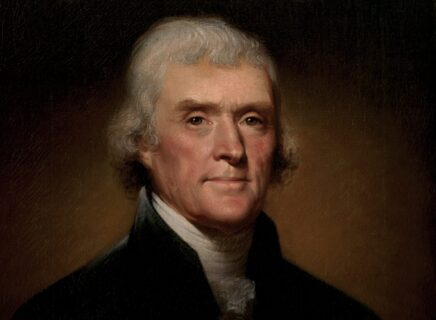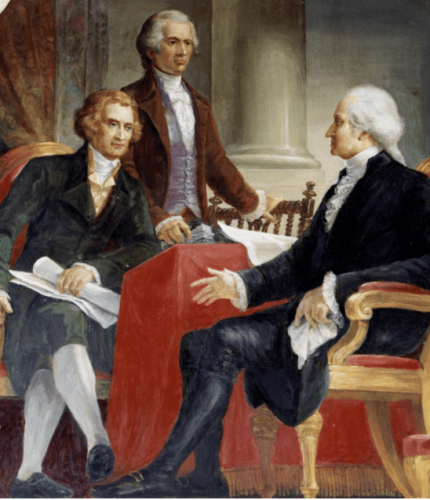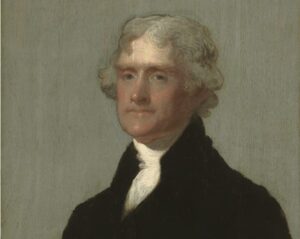
Preserving the Common Ground of American Citizenship: Jefferson’s First Inaugural
The story of the election of 1800 is often told, because for those who cherish self-government it is always worth retelling. The election was the first time in history that a transfer of power occurred by ballot. George Washington became president in 1789 and retained the office with almost unanimous acclamation. John Adams succeeded him in 1796 after a contested election, but Adams represented a continuation of Washington’s government and governing principles. In 1800, Thomas Jefferson and John Adams opposed each other. Former friends in the struggle for independence, each had come to see the political program of the other as a threat to the United States and its people. Their supporters saw the choice between them in the same way. Would those who lost accept the result? Would balloting determine a political change, or would the new effort at self-government collapse into the force or fraud so commonly the means of political change in the past?
Jefferson and the Republicans were victorious, but because of the way votes were cast in the electoral college at the time, Jefferson and his running mate, Aaron Burr, received the same number of votes, requiring that the House of Representatives choose the winner. Federalist congressmen sided with Burr, resulting in 35 ballots without a winner. Finally, Alexander Hamilton persuaded enough Federalists to change their votes and Jefferson became the third president of the United States.
Displeased by the result of the election and the lack of support by his fellow Federalists before the election, Adams declined to attend Jefferson’s inauguration. He thus missed hearing one of the best, if not the best Inaugural Address ever given, noted especially for the quality and effectiveness of its conciliatory rhetoric. “Every difference of opinion,” Jefferson said “is not a difference of principle. We have called by different names brethren of the same principle. We are all Republicans, we are all Federalists.” The speech was effective, as even some Federalists professed to have been pleased by it.
If Jefferson conciliated Federalists with his speech, it was not because he adopted their political opinions. Indeed, Jefferson conceded nothing to his opponents with regard to the policies he planned to pursue. For example, Jefferson explained why republican government, and in particular the American republic, was the strongest on earth; then he asked what more, besides the blessings America enjoyed was necessary to make Americans “a happy and prosperous people?” He answered his own question:
[A] wise and frugal government, which shall restrain men from injuring one another, shall leave them otherwise free to regulate their own pursuits of industry and improvement, and shall not take from the mouth of labor the bread it has earned. This is the sum of good government; and this is necessary to close the circle of our felicities.
This was a restatement of Republican opinion about government. In every detail, it was contrary to what Federalists stood for. The Federalist system established by Alexander Hamilton during Washington’s administration required a government much more active and involved in national life, or at least national economic life, than the one Jefferson outlined in this passage in the Inaugural Address.

Constantino Brumidi, 1872. US Capitol, Room S-213. Architect of the Capitol.
In particular, government frugality would put an end to Hamilton’s federal debt system (funding the debt through bonds sold to the financial class, which would in turn tie this class and its wealth to the new government) and decrease the need for the taxes that would have paid interest on the bonds and funded infrastructure like roads and canals. Without the debt, there would be no need for the excise taxes that funded it and took the bread from the mouth of labor, as Jefferson put it. Nor would the government Jefferson outlined be one to regulate the pursuits of industry, as Hamilton had proposed in his report on manufactures.
If what Jefferson outlined is the sum of good government, from a Federalist perspective it added up to a distinctively Republican government. At another point in his speech, Jefferson declared that one of the essential principles of American government was the “encouragement of agriculture, and of commerce as it handmaid,” clearly implying the subordination of finance, manufacturing, and commerce to the agrarian interest represented by the Republican party.
Behind its rhetoric, the conciliation that the speech promoted derived not from compromising over the political opinions that separated Republicans and Federalists, but from pointing to the political principles they shared. Jefferson summarized these principles in the most important statement of his speech.
All too will bear in mind this sacred principle, that though the will of the majority is in all cases to prevail, that will to be rightful must be reasonable; that the minority possess their equal rights, which equal law must protect, and to violate would be oppression.
By calling attention to the rights of the minority, Jefferson was specifying a limit to the power of the majority. The majority would not thrash around like a wild beast, or rain fire from above like a vengeful god. Instead, it would be reasonable, using its power with respect for the equal rights of the minority through laws equally applied to all.
In losing the election, the Federalists did not lose their freedom—their rights—because these rights were natural and unalienable, as the Declaration of Independence proclaimed. Its author was now telling the Federalists that he remained committed to those rights. Thus, the Federalists could accept the transition from majority to minority status because this transition still left them standing—alongside the Republicans—on the ground of common rights, the common ground of American citizenship.


